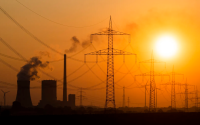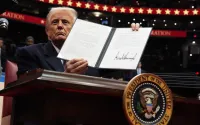7 June 2007Planet ArkBernie Woodall
Peter Darbee, chief executive of PG&E Corp., said beating global warming is also more important than the moon landing in 1969, a challenge President John F. Kennedy put forth in 1961.
"When we set out the target to go to the moon, we only needed the cooperation and collaboration of a portion of the people of the United States," Darbee said in an interview this week with Reuters.
"What the challenge of global warming will require is an unprecedented level of cooperation and collaboration and alignment of mankind. The reality is the challenge for mankind is much greater than putting a man on the moon."
Darbee cites Dick Meserve, president of the Carnegie Institution of Washington and a PG&E director, in saying stopping global warming is the "greatest challenge that has ever faced mankind."
It's hard to remember that not long ago energy executives did not talk much about global warming, said Darbee, 54, who in January 2005 became CEO of PG&E, a US$34 billion company serving 15 million customers in northern and central California.
"After I became CEO, I asked where we were on climate change," said Darbee, who was promoted from chief financial officer at PG&E.
"The answer was that PG&E did not have a view. So we started a process of scientific inquiry. We started to develop some strong conclusions and points of view.
"About a year-and-a-half ago, they came up with three conclusions, said Darbee, "The earth is warming. Mankind is responsible. The need for action is now.
"Today, that's practically boring. Those sets of conclusions. People say, 'No kidding.'"
At energy, environmental and business conferences around the United States this year, people often have spoken of a "tipping point" when it seemed that most of the world agreed global warming was a critical issue that demanded immediate attention.
Darbee said the "tipping point" is not identified by a single event or day, but was a slow building of concern until sometime last year when "the increased concern of global warming became exponential."
Part of that tipping point came in January when PG&E was among 10 major US corporations including General Electric and BP to form the US Climate Action Partnership.
"Washington was used to hearing from environmental groups, Darbee said. "After some time, that isn't news. But when companies and CEOs who are viewed as very pragmatic and financially driven say this is such a problem, I think what happened is the politicians asked themselves if they were behind."






